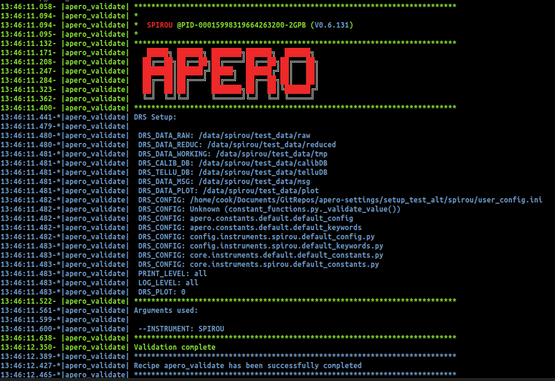Using APERO¶
The user scripts to reduce data are referred to as ‘recipes’.
From a coding point of view this due to the fact that they literally list the steps (where each step is a function or set of functions).
By design recipes are kept to a bare minimum of code and all heavy functionality is done in the functions that are called in the recipes.
Currently supported instruments are:
SPIRou (See the section on recipes here)
There are two ways to use APERO:
Activating the APERO profile¶
To activate an apero profile you need to source the {DRS_UCONGIG}/{PROFILE}.{SYSTEM}.setup script.
Details of this should be in green at the end of the installation process
i.e. for bash:
source {DRS_UCONFIG}/{PROFILE}.bash.setup
i.e. for tcsh/csh/sh
source {DRS_UCONFIG}/{PROFILE}.sh.setup
e.g. with bash and our example profile above:
source {DRS_UCONFIG}/{PROFILE}.sh.setup
We strongly recommend setting up a alias for this
i.e. for bash (i.e. in ~/.bashrc ~/.profile or ~/.bash_aliases):
alias {PROFILE}="source {DRS_UCONFIG}/{PROFILE}.bash.setup"
i.e. for tcsh/csh/sh (i.e. in ~/.tcshrc, ~/.cshrc etc)
alias {PROFILE} "source {DRS_UCONFIG}/{PROFILE}.sh.setup"
Note
This must be done every time one wishes to use APERO (and must be done after one activates the conda environment
conda activate apero-env
One could add these both to automatically happen in a ~/.bashrc but
we recommend activating each time.
Following on from typing this command you should see a splash screen validating the installation and letting you know everything is good to run APERO recipes and tools.

Running recipes indvidiually¶
One can simply run a recipe by using python or the command line. For details on individual recipes please check the recipe definitions for a specific instrument (e.g. for SPIROU click here).
Using the processing script¶
The processing script is the recommended way to run the reduction.
Details of how to use the processing script can be found here.
